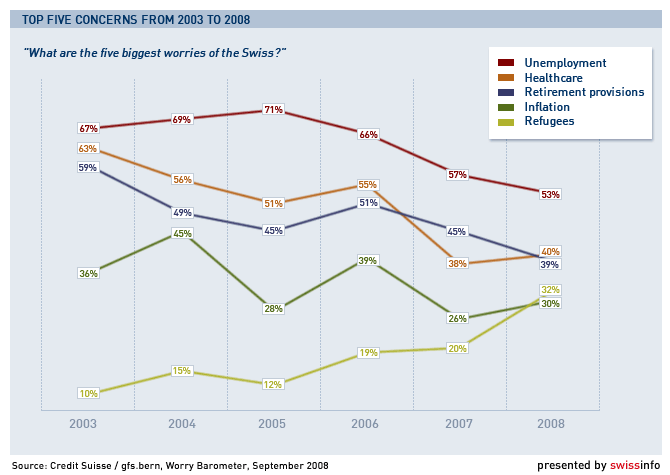Swiss worries turn to economic downturn

The global financial crisis is causing more Swiss to worry about the value of their money, although their top concern is still job loss, an annual survey has found.
Unemployment, healthcare costs and retirement provisions remained the top three concerns in Credit Suisse’s 2008 Worry Barometer, published on Monday.
But the year-on-year highest growing fears among respondents were inflation and overall economic development.
Credit Suisse says the results of the survey, for which 1,008 face-to-face interviews were carried out in September, were “clearly influenced” by the worldwide uncertainty in the financial markets.
“In the current difficult environment it is no surprise that these two issues – particularly overall economic development – are the biggest-growing worries for Swiss citizens,” René Buholzer, head of public policy at Credit Suisse told swissinfo.
“If we look at the results in more detail, we can see that inflation is regarded as a very personal matter since a growing number of Swiss citizens have the impression that their level of disposable income is declining continuously.”
He added that the worries could be expected to persist in 2009 if the economic situation continued to develop as it had in recent months.
Work focused
Unemployment was the biggest concern for the sixth year in a row and worry over retirement provisions dropped to third place after healthcare. Inflation was ranked fourth after rising by 12 per cent compared with 2007. Fears over refugees fell by 11 per cent and became the fifth biggest worry.
“Unemployment has been the greatest worry for six years in succession, even though the rate of unemployment has been very low during this period. This may be attributable to the fact that people in Switzerland are very focused on their work and dedicate their lives to their jobs,” Buholzer explained.
“Consequently, the possibility that they could be made redundant worries them on a very personal level.”
Looking ahead to the next ten years, unemployment is projected to stay top of the list, but poverty is due to move into second place, displacing retirement provision and healthcare costs. Credit Suisse says this reflects the anxiety felt by many Swiss that their personal financial situation could decline in the next ten years.
When questioned on which of the five biggest problems needed to be solved first, unemployment was still ranked first, followed by rising healthcare costs, inflation, poverty and social security.
National pride
Respondents were also questioned on Switzerland’s strengths and weaknesses.
Overall they said Switzerland stood for security, neutrality, landscapes, precision, prosperity and freedom.
Almost everybody – 97 per cent – said the country’s watch-making industry was something to be proud of, 93 per cent cited Swiss neutrality and 87 per cent the country’s constitution.
Around half of respondents (52 per cent) said Switzerland’s main weakness was its numerous laws, while 36 per cent blamed an unfair tax system and 29 per cent viewed multiculturalism as negative.
As in the previous year, 86 per cent of people were either “very” or “somewhat” proud to be Swiss.
Just five per cent were “not” or “not at all” proud. Their number has fallen sharply in recent years: in 2007, 12 per cent of the Swiss were not proud of their country and in 2006 the figure was as high as 22 per cent.
“Growing national pride goes hand in hand with growing awareness of traditional Swiss values,” Credit Suisse noted.
swissinfo, Jessica Dacey
The Credit Suisse Worry Barometer survey has been carried out for the past 32 years. It was completed in 2008 by the market research firm gfs.bern.
A total of 1,008 Swiss voters from German-, French- and Italian-speaking parts of the country were interviewed in person from September 2-28, 2008.
Unemployment 53%
Healthcare costs 40%
Retirement provisions 39%
Inflation 32%
Refugees 30%
Poverty 28%
Personal security 27%
Foreigners 24%
Environmental protection 20%
Social security 20%
Although 43% of respondents said the political system was not up to scratch, they did show confidence in individual institutions.
The federal court had the most support (68%), followed by police, banks, cabinet, the armed forces, the European Union, political parties and the United Nations.
For the first time, the survey measured confidence in different media. The most-trusted sources were television and radio. Just under half of those asked had confidence in paid-for newspapers, followed by free newspapers and the internet.


In compliance with the JTI standards
More: SWI swissinfo.ch certified by the Journalism Trust Initiative










You can find an overview of ongoing debates with our journalists here . Please join us!
If you want to start a conversation about a topic raised in this article or want to report factual errors, email us at english@swissinfo.ch.